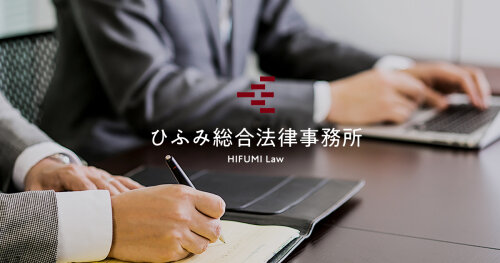Best Landlord & Tenant Lawyers in Tokyo
Share your needs with us, get contacted by law firms.
Free. Takes 2 min.
Free Guide to Hiring a Real Estate Lawyer
List of the best lawyers in Tokyo, Japan
About Landlord & Tenant Law in Tokyo, Japan
The landlord and tenant law in Tokyo, Japan, is governed by the Civil Code and the Act on Land and Building Leases. This framework ensures that both landlords and tenants are treated fairly and that their respective rights and obligations are clearly defined. Disputes often involve issues such as rent payments, lease agreements, maintenance responsibilities, and eviction processes. Given Tokyo's unique urban landscape and high demand for rental properties, understanding these laws is crucial for anyone entering a rental agreement.
Why You May Need a Lawyer
There are several scenarios where legal assistance may be necessary in landlord and tenant matters:
- Lease Agreement Disputes: If there are disagreements over terms or conditions in the lease, a lawyer can help interpret and resolve these issues.
- Eviction Proceedings: For both landlords seeking to evict a tenant and tenants facing eviction, legal guidance can ensure that all actions are compliant with Japanese law.
- Rent Increases or Reductions: Disputes over rent adjustments often require legal intervention to negotiate terms or contest unfair changes.
- Property Maintenance Issues: When disagreements arise over maintenance and repairs, a lawyer can clarify responsibilities as per the lease agreement.
- Deposit Returns: Issues regarding the return of security deposits at the end of a lease can also necessitate legal counsel.
Local Laws Overview
Important aspects of landlord and tenant laws in Tokyo include:
- Security Deposits (Shikikin): Typically, a security deposit equivalent to several months' rent is required, which must be returned less any justified deductions at the lease's end.
- Key Money (Reikin): This is a non-refundable payment made to the landlord upon leasing a property, generally equivalent to one to two months' rent.
- Lease Duration: Standard lease agreements are generally for two years, although terms can be negotiated.
- Eviction Laws: Landlords must have a valid reason to terminate a lease, and proper notice must be provided. Tenants have strong protections against arbitrary eviction.
- Contract Renewal Fees: Upon renewal of a lease, tenants may be required to pay a renewal fee, generally around one month's rent.
Frequently Asked Questions
What is the usual duration of a lease agreement in Tokyo?
Lease agreements typically last for two years, but this can vary depending on negotiations between the landlord and tenant.
Is a landlord allowed to increase rent during a lease term?
Rent increases during the lease are generally not permitted unless stated in the lease agreement or agreed upon by both parties.
Can a tenant leave before the end of their lease term?
Yes, but usually there are penalties involved. It's important to review the lease terms for early termination clauses.
What are the legal grounds for eviction in Tokyo?
Common grounds for eviction include non-payment of rent, breach of lease terms, and the need for the landlord to use the property for themselves or family.
How is the security deposit handled at the end of a lease?
The security deposit should be returned to the tenant minus any deductions for unpaid rent or repairs for tenant-caused damage beyond normal wear and tear.
Are pets allowed in rental properties in Tokyo?
Pet policies vary by landlord and should be specified in the lease agreement. Some properties are pet-friendly while others may have strict no-pet policies.
Is it compulsory to pay key money when renting an apartment?
While not legally required, key money is a common practice in Tokyo and often expected by landlords.
What maintenance responsibilities do tenants have?
Tenants are usually responsible for minor repairs and maintenance. It's essential to clarify these responsibilities in the lease agreement.
Can a tenant sublease their apartment in Tokyo?
Subleasing is typically prohibited unless explicitly allowed by the landlord in the lease agreement.
What should I do if I have a dispute with my landlord?
Attempt to resolve the issue amicably first. If that fails, consider seeking legal advice or mediation services.
Additional Resources
Several resources are available for individuals seeking more information or assistance with landlord and tenant issues in Tokyo:
- Tokyo Metropolitan Government Bureau of Urban Development: Offers guidance and support related to housing and property issues.
- Japanese Ministry of Land, Infrastructure, Transport, and Tourism: Provides comprehensive information regarding housing policies.
- Legal Consultation Centers: Often provide low-cost or free consultations to help resolve tenant and landlord disputes.
Next Steps
If you need legal assistance with a landlord and tenant matter in Tokyo:
- Collect all relevant documentation, including your lease agreement, correspondence with your landlord or tenant, and any other pertinent details.
- Schedule a consultation with a lawyer experienced in Japanese property law to discuss your situation and get professional advice.
- Consider reaching out to mediation services as an alternative dispute resolution mechanism before pursuing litigation.
- Stay informed about your rights and responsibilities as either a landlord or tenant under Japanese law.
Lawzana helps you find the best lawyers and law firms in Tokyo through a curated and pre-screened list of qualified legal professionals. Our platform offers rankings and detailed profiles of attorneys and law firms, allowing you to compare based on practice areas, including Landlord & Tenant, experience, and client feedback.
Each profile includes a description of the firm's areas of practice, client reviews, team members and partners, year of establishment, spoken languages, office locations, contact information, social media presence, and any published articles or resources. Most firms on our platform speak English and are experienced in both local and international legal matters.
Get a quote from top-rated law firms in Tokyo, Japan — quickly, securely, and without unnecessary hassle.
Disclaimer:
The information provided on this page is for general informational purposes only and does not constitute legal advice. While we strive to ensure the accuracy and relevance of the content, legal information may change over time, and interpretations of the law can vary. You should always consult with a qualified legal professional for advice specific to your situation.
We disclaim all liability for actions taken or not taken based on the content of this page. If you believe any information is incorrect or outdated, please contact us, and we will review and update it where appropriate.















